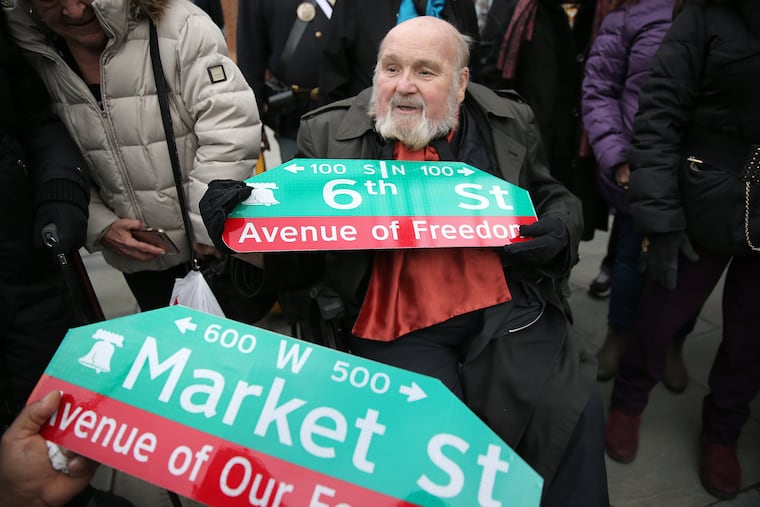Philly renames parts of Market and Sixth Streets in honor of founding fathers, black history
The cross streets of Sixth and Market, where the naming ceremony was held, represented not freedom, but enslavement for nine people who worked in George Washington’s household there.

Philadelphia’s Market Street is home to some of American history’s most iconic moments and figures.
Thomas Jefferson wrote a draft of the Declaration of Independence at Seventh and Market. Benjamin Franklin lived between Third and Fourth, and Quaker founders had their meeting house on Second. Five founding fathers lived along Market at some point, including James Madison.
Up at Sixth and Market is President’s House, where both George Washington and John Adams ran the country’s first executive branch. Today, the site hosts an exhibition focusing not on our first presidents, but on the slaves who worked there.
And so it seemed the appropriate intersection for the honorary naming Monday of stretches on two of the city’s most traveled roads. Two dozen people gathered outside the Independence Visitor Center for a ceremony christening Market Street between Front Street and Eighth Street as “Avenue of Our Founders,” in honor of the country’s founding fathers. At the same time Sixth between Race Street and Lombard Streets was renamed “Avenue of Freedom” to mark key sites of black American history.
City Council approved the changes in December after encouragement from the Association of Philadelphia Tour Guides, who are gaining national recognition among tour guides in recent years for their efforts to professionalize the trade.
The 10-year-old association was founded after some city guides were caught spreading historically inaccurate information — claiming, for example, that Washington and Lincoln walked Philly’s streets at the same time.
“Today, over 200 people have been trained by us to give historically correct tours around the city,” said Joe Becton, a former National Park Service ranger and one of the handful of tour guides who attended Monday’s ceremony. “We’ve come from the point where everyone was smacking our hand to today putting up signs to identify our stories and identify our history."
Councilman Mark Squilla, who sponsored the naming resolution, presented two new street signs to Ed Mauger, a founder of the Association of Philadelphia Tour Guides. Another set of new signs were already installed at the intersection, with the new names on red backgrounds under the primary street names. Intersections throughout the designated area will see new honorary street signs as well.
“America is an invention,” Mauger said. “America was invented in one generation, by the founding fathers, who occupied this street, and their colleagues.” But they left out a race of people, Mauger said, calling historic black civil rights leaders “another group of founding fathers.”
The signs are important, said Bob Skiba, president of tour guides association, because they highlight the area’s forgotten and ignored histories.
“People come to Philadelphia, they look at the Liberty Bell, they look at Independence Hall, and they leave,” he said. "But there’s so many stories here. The more of those stories we can bring forward, the better.”
A part of the President’s House exhibition is dedicated to Ona Judge Staines, who came to Philadelphia from Mount Vernon as Martha Washington’s personal maid. She was never kept in the city for more than six months at a time, to prevent her from becoming a permanent, freed resident. But Judge Staines eventually escaped on a boat to New Hampshire, where she evaded George Washington’s attempts to recapture her, and where she learned to read and write, and lived with her family until her death.
Sixth Street is also the site of Mother Bethel African Methodist Episcopal Church, a hub for the abolitionist movement, said Skiba. The church was founded by Richard Allen, a prominent black bishop, leader and abolitionist. Further north near Race Street was Pennsylvania Hall, the 19th-century abolitionist meeting place which was burned down by antiblack mobs three days after it was completed. The nation’s first stock market was at Market and Front Street — and it also held slave auctions.
Squilla said Philadelphia’s tour guides tell the true, and sometimes unpleasant, stories of the city. The new street signs commemorate “the freedom and liberty that so many people fought for, and that we’re still fighting for today,” he said.
“It’s important to remember that we’re not done fighting," he said, "and to remind people that we have to continue that fight.”